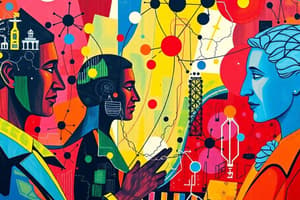Podcast
Questions and Answers
What was the Scientific Revolution?
What was the Scientific Revolution?
The Scientific Revolution was the period of enlightenment when developments in mathematics, physics, astronomy, biology, and chemistry transformed the views about nature.
Who introduced the heliocentric model of the universe?
Who introduced the heliocentric model of the universe?
Nicolaus Copernicus
The Copernican Revolution supports the geocentric model of the universe.
The Copernican Revolution supports the geocentric model of the universe.
False (B)
What is one of the main outcomes of the Scientific Revolution?
What is one of the main outcomes of the Scientific Revolution?
The heliocentric model was formulated in a 40-page outline entitled ______.
The heliocentric model was formulated in a 40-page outline entitled ______.
What does science encompass according to the text?
What does science encompass according to the text?
What is the significance of the scientific revolution?
What is the significance of the scientific revolution?
Which of the following is NOT one of the ways science can be defined?
Which of the following is NOT one of the ways science can be defined?
Science is only about knowledge acquisition.
Science is only about knowledge acquisition.
Who is credited with the Copernican Revolution?
Who is credited with the Copernican Revolution?
What was the title of Charles Darwin's influential treatise?
What was the title of Charles Darwin's influential treatise?
Which revolution challenged the geocentric model of the universe?
Which revolution challenged the geocentric model of the universe?
Darwin's theory of evolution was widely accepted without opposition.
Darwin's theory of evolution was widely accepted without opposition.
The heliocentric model was introduced by ______.
The heliocentric model was introduced by ______.
Study Notes
Intellectual Revolutions and Society
- Intellectual revolutions mark transformative periods influenced by the interaction between science, technology, and society.
- These revolutions shifted perceptions of science and modern understanding, leading to a reevaluation of beliefs and lifestyles.
Scientific Revolution
- Characterized as a period of enlightenment, it comprised significant development across various scientific fields.
- Mathematics, physics, astronomy, biology, and chemistry played vital roles in changing perspectives on nature and science.
Definition of Science
- Science can be defined in three primary ways:
- As an idea: Incorporating theories, observations, and explanations regarding the natural and physical world.
- As an intellectual activity: A systematic examination of the natural world involving observation and experimentation.
- As a body of knowledge: A discipline focused on specific fields of study related to natural phenomena.
Copernican Revolution
- A critical paradigm shift in the 16th century, named after Nicolaus Copernicus, a Polish mathematician and astronomer.
- Introduced the heliocentric model, asserting that the Sun, not the Earth, is the center of the Solar System, challenging the previously held geocentric belief of Ptolemy.
- Copernicus's initial description appeared in a 40-page outline titled "Commentariolus."
- His comprehensive model was later published in "De Revolutionibus Orbium Coelestium" (The Revolution of Celestial Spheres) in 1543, solidifying the heliocentric theory.
Scientific Revolution
- Period of enlightenment transforming views on nature through developments in mathematics, physics, astronomy, biology, and chemistry.
- Birth of modern science emerged from systematic observations and experiments, reshaping beliefs and ways of life.
- Science is intertwined with society; its definition includes:
- As an Idea: Represents theories and systematic explanations of the natural world.
- As an Intellectual Activity: Involves practical studies of the world through observation and experimentation.
- As a Body of Knowledge: A field of study concerning the processes that explain the natural world, often referred to as the school of science.
- As a Personal and Social Activity: Science is both knowledge and collective human activities aimed at enhancing understanding and survival.
Intellectual Revolutions
- Intellectual revolutions signify critical periods in history that altered perceptions of modern science, driven by the interplay of science, technology, and society.
Copernican Revolution
- Named after Nicolaus Copernicus, this 16th-century shift introduced the heliocentric model, placing the Sun at the center of the solar system, contrary to the geocentric model thatpositioned Earth at the center.
- Key publication: “De Revolutionibus Orbium Coelestrium” (1543), which formalized the heliocentric theory and presented the Earth’s rotation on its axis.
- Significance: Catalyzed a new understanding of the universe, marking the inception of modern astronomy.
Darwinian Revolution
- Spearheaded by Charles Darwin’s publication “On The Origin of Species” in 1859, it initiated a new era of intellectual exploration regarding evolution.
- Built upon prior intellectual revolutions, emphasizing human reason's capability to elucidate natural phenomena.
- Introduced natural selection as a mechanism for evolution, where organisms inherit and adapt traits that ensure survival and reproduction.
- Faced controversy, with critics questioning its sufficiency in explaining complex evolutionary processes or refuting divine design.
- The revolution mirrored the Copernican Revolution in highlighting nature’s laws to explain biological survival and reproduction, allowing for a rational framework for the evolution of life.
Freudian Revolution (incomplete, but contextually significant)
- Connected to broader revolutions in science and thought, particularly in understanding human behavior and psychology through the lens of modern scientific inquiry.
Overall Impact
- These revolutions collectively contributed to a reshaped landscape of knowledge, fostering critical thinking and inquiry into natural and human phenomena.
Studying That Suits You
Use AI to generate personalized quizzes and flashcards to suit your learning preferences.
Related Documents
Description
Explore the concepts surrounding the Intellectual Revolution in this lesson of Science, Technology, and Society. Understand its impact on modern thought and society as well as key figures and ideas that shaped this transformative era.




